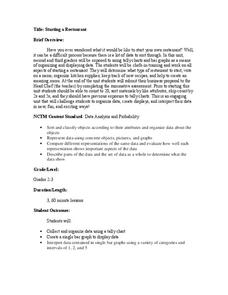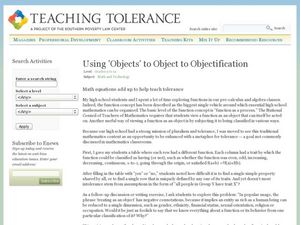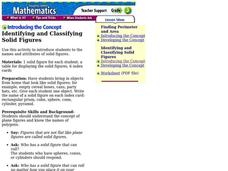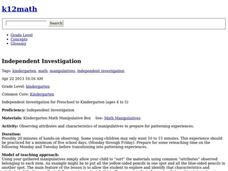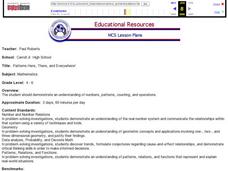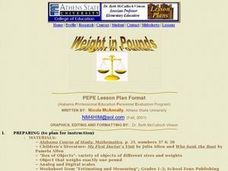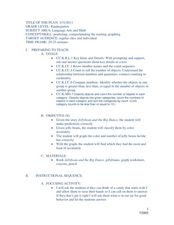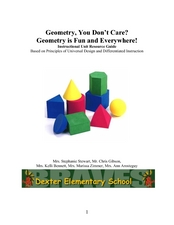Curated OER
Teaching and Learning Through Objects
Students identify and interpret the function, usefulness or utitlity, form, beauty or aesthetics, and meaning, context or story, of objects and how they learn new skills and make things that they learn traditionally, by observation and...
PBS
Button, Button
Youngsters count, classify, and estimate quantities using buttons after a read aloud of The Button Box by Margarette S. Reid. They discuss the difference between guessing and estimating. Based on an experiment, they predict the...
Curated OER
The Five Senses
Study various objects and help kindergarteners use their five senses to classify the objects. They are presented with various objects and then use their five senses to sort and classify the objects. Then they use a Visual Ranking Tool to...
Curated OER
Sorting and Classifying Concrete Objects by Varying Attributes
First graders examine how to sort concrete objects by their attributes. In this sorting lesson, 1st graders listen to Gray Rabbit's Odd One Out by Alan Baker, and discuss the actions of the main character. They practice sorting objects...
Curated OER
Sorting and Classifying
Students explore organization by participating in an object sorting activity. In this classification lesson, students view a diagram which details the different ways to sort items. Students practice sorting random objects in class by...
National Security Agency
Starting a Restaurant
Through an engaging unit, chefs-in-training will sort and classify data using tally charts. Learners will also create bar graphs to display restaurant data and interpret data from bar graphs using a variety of categories....
Curated OER
Using Objects to Object to Objectification
Learners use math functions in part to complete a metaphorical lesson on tolerance. In this math and tolerance lesson, students receive rows of functions and try to find a single simple shared property without success. Learners then...
Curated OER
Identifying and Classifying Solid Figures
Students identify and classify solid geometric figures. In this geometry lesson, students bring in objects that look like solid shapes and identify their attributes. Students identify the number of surfaces and faces on each figure.
Curated OER
Independent Investigation
Students classify objects. In this math lesson, students sort and classify objects based on their characteristics. Students identify characteristics of objects.
Ohio Department of Education
Describing and Creating Plane Figures - Grade One
Young mathematicians draw, create, and describe different shapes using triangles. They discuss attributes of the original and created shapes. Pupils classify the created shapes and draw and write in mathematics journals to communicate...
Curated OER
Sorting Objects
Students sort objects by color. In this classification lesson, students identify the color of the objects and categorize them according to color.
Pennsylvania Department of Education
Exploring Likenesses and Differences of Objects
Students explore how to use similarities and differences when sorting objects. For this exploring likenesses and differences of objects lesson, students examine ways to classify objects. Students make connections and classify...
Curated OER
Patterns Here, There and Everywhere
Pattern recognition is a skill often used in mathematics. Learners count and sort manipulatives, organize the data into a graph and answer questions about the information displayed. They collect the objects to be used and create patterns...
Curated OER
Relations
Students identify, compare, and analyze shapes and numbers. In this analogies and comparison math lesson plan, students warm up by completing 4 worksheets to familiarize themselves with analogies. In small groups, students are challenged...
Pennsylvania Department of Education
Shapes Around Us
Learners use manipulatives to study shapes. They sort shapes and use correct geometric terminology to describe them. Students find real-life examples of 2 and 3 dimensional shapes, and classify figures in their classroom according to...
Curated OER
Weights in Pounds
Second graders define "pound," estimate and compare weights, and classify objects as weighing more or less than a pound.
Curated OER
The Jellybeans and the Big Dance
Enchant your youngsters by reading them The Jellybeans and the Big Dance, by Laura Numeroff and Nate Evans. Ask them to name objects that begin with the letter J like jellybeans. Give each of them some jellybeans to sort by color....
Curated OER
Sorting and Classifying
Students explain why objects area grouped and sequenced in a certain order. In this sorting and classifying lesson plan, students use the website Studyzone.org.
Curated OER
Volume and Surface Area of Right Rectangular Prisms
Students identify the formulas for three-dimensional figures. They use manipulatives to model problems. Students create foldables and explain volume and surface area. Students complete worksheets and classify solids. Students sing a...
Curated OER
One Good Turn Deserves Another
Students make observations about shapes and 1-, 2-, and 3-dimensional objects. They conduct observations and make predictions regarding transformations of simple geometric shapes. They identify shapes that occur in household items.
Curated OER
Polydron Fun
Learners investigate nets as they relate to volume and area. In this geometry lesson plan, students use nets as a visual to deepen their understanding of surface area and volume of objects. They make conjectures about different objects...
Curated OER
Geometry is Fun and EverywhereGeometry, You Don’t Care? Geometry is Fun and Everywhere
Third graders investigate shapes in our world. In this geometry lesson, 3rd graders describe plane and solid shapes and identify angles, solid objects and lines of symmetry. Students use online resources, graphic organizers and conduct...
Curated OER
What's My Rule for Sorting?
Students view objects sorted by one characteristic and name that characteristic. In this sorting rule lesson, students explore to find a new characteristic and write a description of that rule. In early grades the rule might...
Curated OER
2-D and 3-D Presents at Pedro's Party
Fifth graders draw 2-D and 3-D shapes. They sketch and label geometric figures with correct terminology, then explore parallel and perpendicular lines. Pupils sort and classify shapes drawn.





